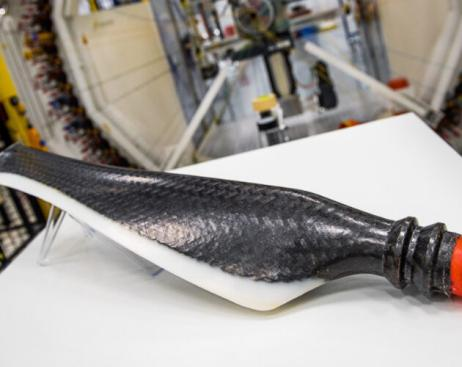Phone: +86 21 51559030
contact@galleon.cc
DigiProp: Developing The Next Generation of Composite Propeller Blades for Turboprop Aircraft
Aug 11,2021

As the demand for cleaner, low-cost air travel is increasing and driving innovation in aircraft design and manufacture, it is vital the UK maintains and extends its world-leading capability in sustainable aviation propulsion technologies. The aerospace industry predicts that the demand for turboprop aircraft will start to rise as the fuel savings are greater on this type of aircraft compared to jets.
As part of Digital Propulsion (DigiProp), the National Composites Centre (NCC) has designed and manufactured a full-scale prototype of a propeller blade and its manufacturing system for turboprop aircraft using a novel process that¡¯s never before been attempted in this application. It has shown real potential to have a high-volume cost saving.
Challenge
Dowty Propellers, part of GE Aviation, approached the NCC to join anexciting collaborative programme to design and develop composite propeller blades that not only reduce costs but improve performance. This innovative work would accelerate Dowty¡¯s digital manufacturing capabilities, demonstrating the UK¡¯s world-leading expertise in propulsion technology for turboprop aircraft.
Background
In 2017, the £20 million DigiProp programme was launched to ensure UK manufacturers lead the way in propulsion technology for turboprop aircraft. It was funded jointly by industry and the Aerospace Technology Institute (ATI) Programme, a joint government-industry investment delivered through a partnership between ATI, the Department for Business, Energy and Industrial Strategy (BEIS) and Innovate UK. DigiProp was led by Dowty Propellers working in partnership with the NCC, the University of Sheffield Advanced Manufacturing Research Centre (AMRC) and the Manufacturing Technology Centre (MTC) ¨C three of the seven centres of the High Value Manufacturing Catapult. The aim of the programme was to exploit the latest design, manufacturing and test methods to increase performance in propulsion technology while reducing costs.
Innovation
Through DigiProp, the NCC has identified triaxial carbon fibre braiding technology of advanced thermoplastic composites as a low-cost, automatable, high performance and environmentally friendly manufacturing process.Thermoplastic composites can be recycled by being melted down and formed into another product, therefore reducing waste. The whole process is automatable, resulting in a reduced number of defects and less reworking required.
Thermoplastic triaxial braiding for the structural component of a large propeller blade has not been attempted before. For smaller propeller blades, the NCC discovered that it is a quicker and easier manufacturing process with very significant cost benefits.
The NCC team has developed a new manufacturing process using a combination of bladder moulding and braiding of recyclable carbon fibre composites. The bladder system involves the creation of a wax mould coated with a silicone product, which creates a mandrel for overbraiding with the coming led material.
As part of DigiProp, the NCC team reviewed the blade manufacturing workflow, exploring different technologies and processes to be able to input the blade requirements and a set of geometric constraints to create as much flexibility as possible in the design of the new blade structure.
To produce lighter weight blades at a lower production cost, the NCC team also conducted materials and process down selection. After exploring five options within the cost parameters, they used this data to conduct trials for testing the technologies and processes. Six prototype propeller blades were developed in total, building on and enhancing design and manufacturing techniques each time.
Impact
Compared to the current process, the time saving for manufacturing blades wassubstantially better than previous manufacturing processes, so this would havethe potential to result in a high-volume cost saving. The change in materials hasreduced the consolidation stage of the process substantially.
By using thermoplastics, the NCC has found a time reduction through this cure process to around five minutes rather than the four hours typically found for asimilar thermoset epoxy resin consolidation. There is a fatigue life improvementthrough removal of the foam core, which has also resulted in a reduction in weight. There is also improved damage tolerance when considering foreignobject impact.
At present, the material selection and technology of engine fan blade are also difficult and key points in civil aircraft manufacturing. Precision manufacturing is also a very important process. The 7th Annual Aeronautical Materials and Manufacturing Technology International Forum 2021 will be held on December 2nd - 3rd, 2021, in Shanghai. You are welcome to participate.
Click here to register your interest or contact with Lucy directly.
